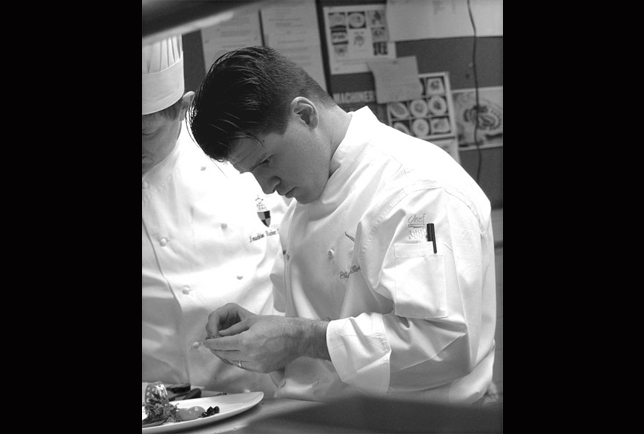
Even though chef Richard Rosendale of The Greenbrier in White Sulphur Springs, W.Va., won this year’s famed Bocuse d’Or USA competition, he won’t have much time to bask in his recent victory. Rosendale needs to start preparing for the next step — the 2013 international Bocuse d’Or in Lyon, France. We caught up with the chef to get his thoughts on the contest, his plans for Lyon and where he finds inspiration.
How did you prepare for the competition?
The reality is that you only have a few months to really get ready for the formal competition itself, but the actual skills and all the training, in my opinion, have been built up over a lifetime. Everything that you do day in and day out — the way that you work — is directly aligned with doing a grand competition like the Bocuse d’Or. I’ve had my sights on this competition for 10 years.
What was the hardest part of the competition?
I think probably the anticipation and the period while you are there getting ready to start. Once you get into the kitchen and start cooking, it’s very exciting. And I think a lot of people have a challenge dealing with the loud noise; I have no problem pushing it out. But I’d say just the anticipation the night before because it really starts settling in that you have just this one opportunity to get in there and cook and show the judges what you’re capable of. And when you think of how ambitious the dishes are, there’s a myriad of things that could go wrong — anything from scorching a sauce to spilling something or overseasoning or undercooking something could prove to be disastrous, and you could lose this wonderful opportunity. So that thought sometimes can play games with you, and that can psych you out the night before. Once you get into the kitchen — at least in my case — you’re usually off and running.
How are you going to spend this next year preparing for the international Bocuse d’Or competition in Lyon?
First of all, the host of coaches and support I have is like a culinary dream team with Thomas Keller, Daniel Boulud, Gavin Kaysen, Gabriel Kreuther, Grant Achatz — it’s really a culinary powerhouse. So that certainly gives you a high degree of comfort, knowing you have these incredible resources. But also the expectation is obviously very high, so I think it’s going to be a lot of research and development. It’s essentially going to be another full-time job with all of the practicing I’m going to be doing. But I think one of the neatest things we’re doing is actually re-creating the kitchen in Lyon here at The Greenbrier. They’re going to be sending me a duplicate set of equipment here at the hotel, and we’re going to be setting up the kitchen here in the old bunker — we have an old bunker in the hotel, believe it or not, that was built in the case of a nuclear fallout. And in that bunker is a kitchen that we no longer use, so we’re going to convert that into a replica of the kitchen you’d find in Lyon.
Who do you look up to in the culinary world?
Everyone that’s involved in this, Daniel Boulud, Thomas Keller — they obviously have made incredible contributions to the craft, but I’ve been very influenced by my grandparents over the years. One is German, one is Italian and they kind of nurtured my love for food. But in the industry though, I’ve always admired the very chefs that I’ve had the opportunity here to be working with, so in essence it’s a chef’s dream come true to be able to do this.
What is your food philosophy?
I think a lot of chefs talk farm to table and about fresh ingredients, and that’s great, but in my opinion, that should be just a principle that all chefs should follow. I’m very much a technician and someone that pays a lot of attention to the craft itself — that is, the very technically sound application of recipes. I use a blend of very classical recipes with very modern techniques. It’s almost like you have to have Escoffier in one hand — which is a classical French cookbook — and then in the other hand, you have to have a heating immersion circulator — which is a high-tech piece of cooking equipment. So in other words, it’s like having a very modern approach but also paying homage to timeless techniques and recipes of the past. And that is very much what I do here at The Greenbrier, a 200-year-old resort. And in many cases, I’m charged with the responsibility to reinvent the old and make it new again. So all of your preparation should be met with the guiding principle that it should be delicious.
What are some of your favorite cities that you’ve traveled to and why?
I love traveling, and all of the competitions have taken me to lots of neat cities. I think one of the coolest was Trier, Germany. I like a lot of the cities in Germany because they have so much character — and this is very true of a lot of places in Europe — but I really enjoyed walking through the streets and looking at the structures and buildings. It’s almost like every structure told a story, and I found myself very captivated by the buildings and the history. It’s almost like, “If those walls could speak, what would they say?”
